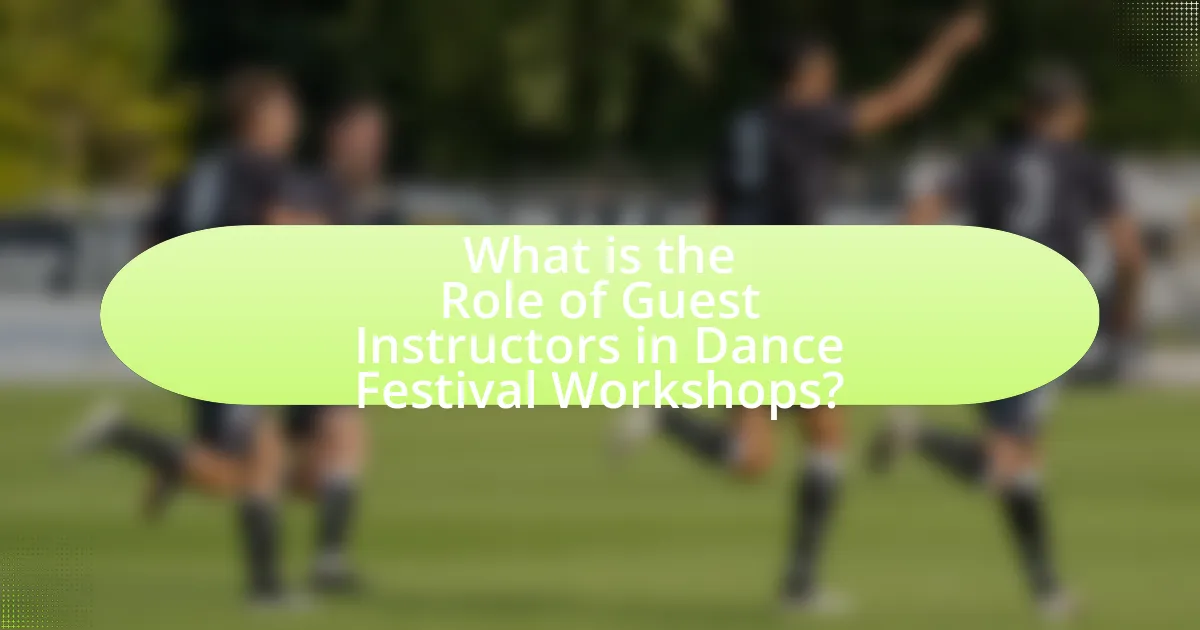Guest instructors play a vital role in dance festival workshops by enhancing the educational experience through their diverse expertise and unique teaching styles. They introduce specialized techniques and cultural dance forms that broaden participants’ understanding of dance, fostering creativity and innovation. Additionally, guest instructors provide valuable networking opportunities and contribute to the overall diversity of dance styles represented in workshops. Their involvement not only enriches the curriculum but also helps shape workshop themes and promotes the festival, making careful selection and collaboration with organizers essential for maximizing impact.

What is the Role of Guest Instructors in Dance Festival Workshops?
Guest instructors in dance festival workshops serve to enhance the educational experience by bringing diverse expertise and fresh perspectives to participants. These instructors often possess specialized skills or unique styles that can broaden the dancers’ understanding and appreciation of various dance forms. For instance, a guest instructor may introduce contemporary techniques or cultural dance traditions that are not typically covered in regular classes, thereby enriching the curriculum. Their involvement can also foster networking opportunities for attendees, as they often have connections within the dance community that can lead to future collaborations or performances.
How do guest instructors contribute to the overall experience of dance festival workshops?
Guest instructors enhance the overall experience of dance festival workshops by bringing diverse expertise and fresh perspectives to participants. Their unique teaching styles and specialized knowledge introduce new techniques and concepts, enriching the learning environment. For instance, a guest instructor with a background in contemporary dance can offer insights that differ from the festival’s regular instructors, fostering creativity and innovation among attendees. Additionally, guest instructors often have extensive professional experience, which can inspire and motivate participants, as they share real-world applications of dance. This exposure to varied methodologies and experiences ultimately elevates the quality of the workshops and broadens the participants’ understanding of dance as an art form.
What unique skills do guest instructors bring to these workshops?
Guest instructors bring specialized expertise and diverse perspectives to dance festival workshops. Their unique skills often include advanced techniques in specific dance styles, innovative choreography, and extensive performance experience. For instance, a guest instructor with a background in contemporary dance may introduce cutting-edge movements and concepts that enrich participants’ understanding. Additionally, these instructors often have connections to industry professionals, providing valuable networking opportunities for attendees. Their varied teaching methods can also enhance the learning experience, catering to different learning styles and fostering creativity among participants.
How do guest instructors enhance the learning environment for participants?
Guest instructors enhance the learning environment for participants by bringing diverse expertise and fresh perspectives to the workshops. Their unique backgrounds and experiences introduce new techniques and styles, which can stimulate creativity and broaden participants’ skill sets. For instance, a guest instructor with a background in contemporary dance may offer insights that differ from the primary instructor’s focus on ballet, thereby enriching the overall learning experience. Additionally, guest instructors often provide networking opportunities, connecting participants with industry professionals and fostering a sense of community within the dance festival. This interaction can lead to collaborative projects and future learning opportunities, further enhancing the educational environment.
Why are guest instructors important for the diversity of dance styles in workshops?
Guest instructors are important for the diversity of dance styles in workshops because they bring unique perspectives and techniques from various cultural backgrounds. This exposure allows participants to learn different forms of dance that they may not encounter in their regular classes, enriching their overall experience. For instance, a guest instructor specializing in Afro-Brazilian dance can introduce rhythms and movements distinct from traditional ballet or contemporary styles, fostering a broader understanding of dance as an art form. Additionally, research indicates that diversity in teaching methods enhances creativity and adaptability among dancers, making workshops more dynamic and inclusive.
What types of dance styles do guest instructors typically represent?
Guest instructors typically represent a diverse range of dance styles, including ballet, contemporary, hip-hop, jazz, and ballroom. These styles reflect the varied expertise and backgrounds of the instructors, allowing participants to experience different techniques and artistic expressions. For instance, ballet instructors may focus on classical techniques, while hip-hop instructors introduce urban dance forms, showcasing the breadth of dance culture. This variety enhances the educational experience at dance festivals, catering to a wide audience and promoting cross-disciplinary learning.
How does the inclusion of various dance styles benefit workshop attendees?
The inclusion of various dance styles benefits workshop attendees by enhancing their versatility and broadening their skill set. Exposure to different techniques and cultural expressions allows participants to develop a more comprehensive understanding of dance, which can improve their overall performance and creativity. Research indicates that diverse dance experiences can lead to increased cognitive flexibility, as participants learn to adapt to various rhythms and movements. This adaptability is crucial in dance, where improvisation and interpretation play significant roles. Additionally, engaging with multiple styles fosters a sense of community among attendees, as they share experiences and learn from one another, ultimately enriching the workshop environment.
What challenges do guest instructors face in dance festival workshops?
Guest instructors in dance festival workshops face several challenges, including adapting to diverse skill levels among participants. This variability can complicate lesson planning and delivery, as instructors must ensure that their teaching methods are accessible to both beginners and advanced dancers. Additionally, guest instructors often encounter logistical issues, such as limited rehearsal time and unfamiliarity with the venue, which can hinder their ability to effectively teach and engage students. Furthermore, they may experience pressure to meet the expectations of festival organizers and participants, which can lead to stress and impact their performance. These challenges are compounded by the need to quickly establish rapport with students, which is essential for effective teaching in a short workshop format.
How do guest instructors adapt to different teaching environments?
Guest instructors adapt to different teaching environments by assessing the specific needs and dynamics of each group they encounter. They utilize various teaching methods, such as hands-on demonstrations, interactive exercises, and tailored feedback, to engage participants effectively. For instance, research indicates that instructors who modify their communication styles and instructional techniques based on the audience’s skill level and cultural background enhance learning outcomes. This adaptability is crucial in dance festival workshops, where diverse participants may have varying levels of experience and learning preferences.
What strategies do guest instructors use to engage diverse audiences?
Guest instructors engage diverse audiences by employing inclusive teaching methods, adapting content to various skill levels, and fostering an interactive environment. These strategies ensure that participants from different backgrounds feel valued and included. For instance, using a variety of teaching styles—such as visual demonstrations, verbal explanations, and hands-on practice—accommodates different learning preferences. Additionally, guest instructors often incorporate culturally relevant material, which resonates with a broader audience and enhances relatability. Research indicates that diverse teaching approaches can improve engagement and retention rates among participants, making these strategies effective in dance festival workshops.
How do guest instructors collaborate with festival organizers?
Guest instructors collaborate with festival organizers by engaging in planning, curriculum development, and logistical coordination. They work closely with organizers to align their teaching styles and workshop content with the festival’s overall theme and objectives. This collaboration often includes discussions about scheduling, participant demographics, and resource allocation to ensure a cohesive experience for attendees. For instance, guest instructors may provide input on the types of classes offered based on their expertise, which helps organizers tailor the festival to meet audience expectations and enhance the educational value.
What role do guest instructors play in shaping workshop curricula?
Guest instructors play a crucial role in shaping workshop curricula by bringing diverse expertise and fresh perspectives to the educational experience. Their specialized knowledge in various dance styles or techniques enhances the curriculum, allowing for a broader range of skills and concepts to be taught. For instance, a guest instructor with a background in contemporary dance can introduce innovative movement practices that may not be covered by regular faculty, thereby enriching the overall learning environment. This integration of varied teaching methods and styles not only diversifies the curriculum but also fosters creativity and adaptability among participants, ultimately leading to a more comprehensive dance education.
How do guest instructors contribute to the promotion of the festival?
Guest instructors enhance the promotion of the festival by attracting diverse audiences and increasing visibility through their established reputations. Their participation often draws their own followers and students, which expands the festival’s reach. For instance, when a well-known instructor leads a workshop, it can generate significant media attention and social media buzz, thereby elevating the festival’s profile. Additionally, guest instructors frequently engage in promotional activities, such as interviews and social media posts, which further amplify the festival’s marketing efforts.
What are the best practices for selecting guest instructors for dance festival workshops?
The best practices for selecting guest instructors for dance festival workshops include evaluating their teaching experience, assessing their dance expertise, and considering their ability to engage with diverse audiences. Experienced instructors often have a proven track record of successful workshops, which can enhance the festival’s reputation. Additionally, instructors with specialized skills in various dance styles can attract a broader participant base, ensuring a rich learning environment. Engaging instructors who can connect with attendees fosters a positive atmosphere, encouraging participation and retention. Research indicates that workshops led by skilled instructors significantly improve participant satisfaction and learning outcomes, reinforcing the importance of careful selection.
What criteria should organizers consider when inviting guest instructors?
Organizers should consider the expertise, teaching style, and reputation of guest instructors when inviting them. Expertise ensures that the instructor possesses the necessary skills and knowledge in their dance genre, which is crucial for delivering high-quality workshops. Teaching style is important as it affects how well the instructor can engage and connect with participants, enhancing the overall learning experience. Reputation, often reflected in past performances and student feedback, indicates the instructor’s ability to attract attendees and contribute positively to the festival’s image. These criteria collectively ensure that the selected instructors align with the festival’s goals and audience expectations.
How can organizers ensure a good fit between guest instructors and workshop themes?
Organizers can ensure a good fit between guest instructors and workshop themes by conducting thorough research on the instructors’ expertise and aligning it with the specific objectives of the workshop. This involves reviewing the instructors’ backgrounds, teaching styles, and previous workshop experiences to confirm their relevance to the theme. For instance, if a workshop focuses on contemporary dance techniques, selecting an instructor with a strong background in contemporary choreography and pedagogy will enhance the workshop’s effectiveness. Additionally, soliciting feedback from past participants about their expectations can help tailor the instructor selection process, ensuring that the chosen instructors resonate with the intended audience and workshop goals.
What tips can guest instructors follow to maximize their impact in workshops?
Guest instructors can maximize their impact in workshops by engaging participants through interactive teaching methods. Utilizing techniques such as group activities, hands-on demonstrations, and real-time feedback fosters a collaborative learning environment, which has been shown to enhance retention and understanding of material. Research indicates that active participation can increase learning outcomes by up to 75%, compared to traditional lecture-based approaches. Additionally, guest instructors should tailor their content to the specific skill levels and interests of the participants, ensuring relevance and accessibility. This customization can lead to higher satisfaction rates, as evidenced by surveys indicating that 90% of participants prefer workshops that address their individual needs.
